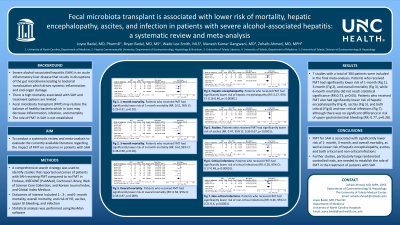Monday Poster Session
Category: Liver
P2441 - Fecal Microbiota Transplant Is Associated With Lower Risk of Mortality, Hepatic Encephalopathy, Ascites, and Infection Patients with Severe Alcohol-Associated Hepatitis: A Systematic Review and Meta-Analysis
Monday, October 23, 2023
10:30 AM - 4:15 PM PT
Location: Exhibit Hall


Joyce Badal, MD, PharmD
University of North Carolina Hospitals, Chapel Hill
Chapel Hill, NC
Presenting Author(s)
Joyce Badal, MD, PharmD1, Bryan D. Badal, MD, MS2, Wade M.. Lee-Smith, MLS3, Manesh Kumar Gangwani, MD4, Zohaib Ahmed, MD5
1University of North Carolina Hospitals, Chapel Hill, Chapel Hill, NC; 2Virginia Commonwealth University, Richmond, VA; 3University of Toledo, Toledo, OH; 4University of Toledo Medical Center, Toledo, OH; 5University of Toledo Health Sciences Center, Toledo, OH
Introduction: Severe alcohol-associated hepatitis (SAH) is an acute, inflammatory liver disease that results in disruptions of the gut microbiome leading to bacterial translocation which drives systemic inflammation and end-organ damage. Despite high risk of mortality, treatment options are limited. Fecal microbiota transplant (FMT) may help restore the balance of healthy bacteria in patients with disrupted gut microbiomes due to SAH, which may decrease systemic inflammation, infection, and mortality. As the role of FMT in the treatment of SAH is not yet established, we conducted a systematic review and meta-analysis to evaluate the currently available literature regarding the impact of FMT on outcomes in patients with SAH.
Methods: A comprehensive search strategy was used to identify studies that reported outcomes of patients with SAH receiving FMT compared to no FMT in Embase, MEDLINE (PubMed), Cochrane Library, Web of Science Core Collection, and Korean Journal Index, and Global Index Medicus. Outcomes of interest included 1-, 3-, and 6-month mortality, overall mortality, and risk of HE, ascites, upper GI bleeding, and infection. RevMan software was used for statistical analysis.
Results: 7 studies with a total of 384 patients were included in the final meta-analysis. Patients who received FMT had significantly lower risk of 1-month mortality (RR: 0.51, 95% CI: 0.29-0.91, p=0.02), 3-month mortality (RR: 0.61, 95% CI: 0.38-0.98, p=0.04), and overall mortality (RR: 0.58, 95% CI: 0.38-0.87, p=0.009) compared to those who did not receive FMT, although the difference in 6-month mortality did not reach statistical significance (RR: 0.73, 95% CI: 0.18-2.89, p=0.65). Patients who received FMT also had significantly lower risk of hepatic encephalopathy (RR: 0.27, 95% CI: 0.16-0.46, p< 0.00001), ascites (RR: 0.47, 95% CI: 0.33-0.67, p< 0.0001), non-critical infections (RR: 0.36, 95% CI: 0.21-0.6, p=0.0001), and critical infections (RR: 0.28, 95% CI: 0.17-0.48, p< 0.00001). There was no significant difference in risk of upper gastrointestinal bleeding (RR: 0.77, 95% CI: 0.48-1.24, p=0.28).
Discussion: FMT for SAH is associated with significantly lower risk of 1-month, 3-month, and overall mortality, as well as lower risk of hepatic encephalopathy, ascites, and both critical and non-critical infections. Further studies, particularly large randomized controlled trials, are needed to establish the role of FMT in the treatment of patients with SAH.
Disclosures:
Joyce Badal, MD, PharmD1, Bryan D. Badal, MD, MS2, Wade M.. Lee-Smith, MLS3, Manesh Kumar Gangwani, MD4, Zohaib Ahmed, MD5. P2441 - Fecal Microbiota Transplant Is Associated With Lower Risk of Mortality, Hepatic Encephalopathy, Ascites, and Infection Patients with Severe Alcohol-Associated Hepatitis: A Systematic Review and Meta-Analysis, ACG 2023 Annual Scientific Meeting Abstracts. Vancouver, BC, Canada: American College of Gastroenterology.
1University of North Carolina Hospitals, Chapel Hill, Chapel Hill, NC; 2Virginia Commonwealth University, Richmond, VA; 3University of Toledo, Toledo, OH; 4University of Toledo Medical Center, Toledo, OH; 5University of Toledo Health Sciences Center, Toledo, OH
Introduction: Severe alcohol-associated hepatitis (SAH) is an acute, inflammatory liver disease that results in disruptions of the gut microbiome leading to bacterial translocation which drives systemic inflammation and end-organ damage. Despite high risk of mortality, treatment options are limited. Fecal microbiota transplant (FMT) may help restore the balance of healthy bacteria in patients with disrupted gut microbiomes due to SAH, which may decrease systemic inflammation, infection, and mortality. As the role of FMT in the treatment of SAH is not yet established, we conducted a systematic review and meta-analysis to evaluate the currently available literature regarding the impact of FMT on outcomes in patients with SAH.
Methods: A comprehensive search strategy was used to identify studies that reported outcomes of patients with SAH receiving FMT compared to no FMT in Embase, MEDLINE (PubMed), Cochrane Library, Web of Science Core Collection, and Korean Journal Index, and Global Index Medicus. Outcomes of interest included 1-, 3-, and 6-month mortality, overall mortality, and risk of HE, ascites, upper GI bleeding, and infection. RevMan software was used for statistical analysis.
Results: 7 studies with a total of 384 patients were included in the final meta-analysis. Patients who received FMT had significantly lower risk of 1-month mortality (RR: 0.51, 95% CI: 0.29-0.91, p=0.02), 3-month mortality (RR: 0.61, 95% CI: 0.38-0.98, p=0.04), and overall mortality (RR: 0.58, 95% CI: 0.38-0.87, p=0.009) compared to those who did not receive FMT, although the difference in 6-month mortality did not reach statistical significance (RR: 0.73, 95% CI: 0.18-2.89, p=0.65). Patients who received FMT also had significantly lower risk of hepatic encephalopathy (RR: 0.27, 95% CI: 0.16-0.46, p< 0.00001), ascites (RR: 0.47, 95% CI: 0.33-0.67, p< 0.0001), non-critical infections (RR: 0.36, 95% CI: 0.21-0.6, p=0.0001), and critical infections (RR: 0.28, 95% CI: 0.17-0.48, p< 0.00001). There was no significant difference in risk of upper gastrointestinal bleeding (RR: 0.77, 95% CI: 0.48-1.24, p=0.28).
Discussion: FMT for SAH is associated with significantly lower risk of 1-month, 3-month, and overall mortality, as well as lower risk of hepatic encephalopathy, ascites, and both critical and non-critical infections. Further studies, particularly large randomized controlled trials, are needed to establish the role of FMT in the treatment of patients with SAH.
Disclosures:
Joyce Badal indicated no relevant financial relationships.
Bryan Badal indicated no relevant financial relationships.
Wade Lee-Smith indicated no relevant financial relationships.
Manesh Kumar Gangwani indicated no relevant financial relationships.
Zohaib Ahmed indicated no relevant financial relationships.
Joyce Badal, MD, PharmD1, Bryan D. Badal, MD, MS2, Wade M.. Lee-Smith, MLS3, Manesh Kumar Gangwani, MD4, Zohaib Ahmed, MD5. P2441 - Fecal Microbiota Transplant Is Associated With Lower Risk of Mortality, Hepatic Encephalopathy, Ascites, and Infection Patients with Severe Alcohol-Associated Hepatitis: A Systematic Review and Meta-Analysis, ACG 2023 Annual Scientific Meeting Abstracts. Vancouver, BC, Canada: American College of Gastroenterology.
